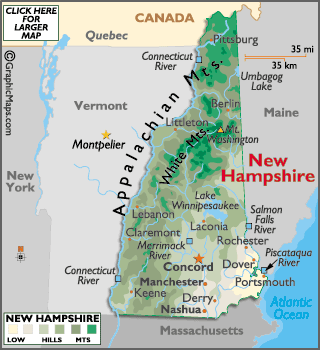Remember the brouhaha a few weeks ago when it was announced that an upstart refugee resettlement contractor from Manchester, NH was eyeing Dover and surrounding towns as a new resettlement site. We reported on it here. A plan for a public meeting at which the contractor would answer questions was abruptly cancelled when publicity began to swirl.
After ‘pungentpeppers’ spotted this letter (below) we learned that the Dover mayor and council did entertain comments this past week (absent the contractor ORIS) and here is a story on the meeting at Foster’s Daily Democrat. The tone of the meeting sure makes it sound like Dover is not ready to take the migrant spillover from an overloaded Manchester.
Here is a letter to the editor (Here’s what ORIS is not telling Dover) published yesterday at Foster’s. The writer has a unique perspective having been born in Dover and then having lived in the Somali capital of New England—Lewiston, ME. Emphasis below is mine:

I have been following with concern the possibility of Congolese “refugees” relocating to the Tri-Cities. I was born and raised in Dover but spent most of my later years in Lewiston, Maine. Having lived through this situation in Lewiston, I believe I am qualified to provide you an honest assessment of what will become of the Tri-Cities if ORIS is successful. Although ORIS canceled the Aug. 13 meeting, do not believe for a moment they have gone away for good. Due to national immigration issues public sentiment is not on their side. When they do return expect them to be tactical in their approach, better prepared, and wield a heavier hand.
Lewiston’s first group of Somali’s arrived in 2000 during the dark of night, thus city officials were not prepared for the onslaught of people who arrived with nothing but the shirts on their backs. The exact number is still unknown, but most estimates are between 1,000 and 2,000. Twelve years later, the number is still unknown but is believed to be around 6,000. The numbers are not known because given their nomadic culture some leave, some come back, some don’t come back, and more tribes continue to arrive.
To believe the number of Congolese ORIS claims would be relocated to your area would be dangerously naïve. What ORIS is not telling you is that number simply represents the first wave. Adding to that is the multiple effect as many will have additional children and grandchildren and your welfare budget will spiral out of control.
The financial burden on a city with about 36,000 residents has been tremendous. State and Federal governments have not and will not pick up refugee related expenses leaving the residents of Lewiston to bear the entire cost and in very many cases at the expense of the working poor, veterans, disabled, and elderly, most who have worked their entire lives in Lewiston. When it comes to social services, expect the refugees to go directly to the head of the line.
If ORIS is successful expect your costs for education to increase much more than proportionately. Many of the positions that will need to be added are positions you do not have. You should plan for additional personnel to teach English as a second language. Lewiston had 50 students enrolled in ESL the year prior to the Somali’s arrival. The year after their arrival the number skyrocketed to 300.
Shortly after the first wave of Somalis arrived the city provided a school in their neighborhood for them to attend. You should be prepared for outrage from parents and children when the Congolese demand their children be allowed to attend other neighborhood schools thus displacing many children who have long attended their “neighborhood” school.
You should plan to increase your police budgets as well as adding additional police in your schools. The Somali and Bantu tribes are a latter day version of the Hatfields and McCoys. There have been numerous physical altercations between the two tribes as well as gang activity. Lewiston Deputy Police Chief James Minkowsky stated “we haven’t seen that it’s been fueled by drugs or alcohol but in some cases they seem to do it for the thrill of it. We’re not seeing the colors or the monikers but it’s still a gang mentality”. Prior to these attacks group robberies were almost unheard of according to police.
Those against refugee relocation should be prepared for broad accusations of being racist. In October of 2002 then Mayor Laurier Raymond wrote a letter to the Somali leaders asking them to hold off bringing more to Lewiston as the city could no longer afford the crippling financial burden. National media quickly picked up on the story labeling him a racist for simply doing what he was elected to do, govern the city.
In closing, reading publications such as The New Yorker and Newsweek would have you believe the influx of refugees has “revived” downtown Lewiston while many locals refer to the downtown area as “Little Mogadishu”. I would highly recommend you take the hour and a half ride up to Lewiston to see for yourselves what will become of your towns if ORIS is successful. A picture is worth a thousand words.
Paul Spellman
Lakewood Ranch, Fla.
We have an extensive archive on Lewiston, ME. Click here for dozens of posts on problems there. One of our top posts of all time at RRW is this 2009 post—Somali migration to Maine…. We also have written many posts on the problems nearby Manchester, NH is having especially as the mayor and other city leaders want to slow the flow to their city now—something that is virtually impossible to do once the refugee seed community has been established. In addition to the natural demographic growth and the secondary migration mentioned by Mr. Spellman above there is the role the contractor plays in resettling the extended family members of the first refugees dropped off—it is called family reunification or chain migration.





